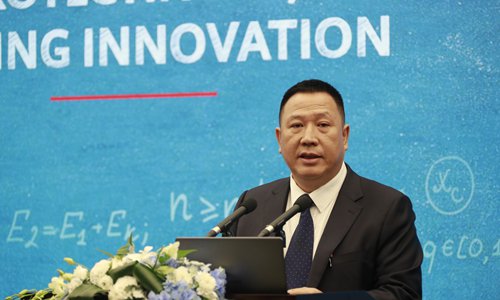HOME >> BUSINESS
IP protection should not be politicized: Huawei
By Chen Qingqing in Shenzhen Source:Global Times Published: 2019/6/27 11:59:05

Song Liuping, Huawei's chief legal officer, speaks to the press on Thursday. Photo: Courtesy of Huawei
Huawei will never weaponize its patent portfolio and that disputes over intellectual property (IP) should not be politicized, said a senior executive of the company.
By the end of 2018, Huawei has been granted 87,805 patents, of which 11,152 are US patents, Song Liuping, Huawei’s chief legal officer, revealed at a press conference on Thursday in Shenzhen, South China’s Guangdong Province.
Since 2015, Huawei has received over $1.4 billion in licensing revenue, and as a technology company, Huawei is principled to protect IP rights and it is the company’s primary responsibility, he added.
Disputes over IP are common, Huawei has been on both fronts of these disputes, as a defender and a victim, but over the past 30 years, no court has ever ruled Huawei of engaging in any malicious IP theft, the senior executive said.
US Senator Marco Rubio recently proposed a legislation to prevent Huawei from seeking damages in US patent courts, after the Chinese company charged Verizon Communications Inc. for over $1 billion in patent license fees.
We don’t believe Rubio’s proposal could be passed at all by the US legislators, Song said.
Under his proposal, Huawei would "not be allowed to seek relief under US law with respect to US patents, including any legal action over patent infringement."
If any government selectively strips a company from IP protection, it will wreck the very foundation of global innovation, Song said.
Verizon patent negotiation is a normal business practice, which does not signal a shift in Huawei’s strategy on patent issue, Song said responding to media queries.
From 3G to 4G to 5G, Huawei is a primary holder of core patents and it is also a licenser, thus it is the company’s right and obligation to collect revenues using fair and non-discriminatory means, he noted.
“It’s a dangerous precedent that some US politicians are proposing to ban Huawei from seeking IPR protection in the US, as IPR protection is consistent with the rights provided under its Constitution,” he said while commenting on Rubio’s recent proposal.
In fact, Huawei is one of the major contributors to global standards, and all participants are also sharing Huawei’s product results, Song told the Global Times.
“Huawei is also the right holder of standard essential patents and is registered in China. Applicants in the US and Europe who adopt these standards are using Huawei’s patent,” he said.
RELATED ARTICLES:
Posted in: COMPANIES